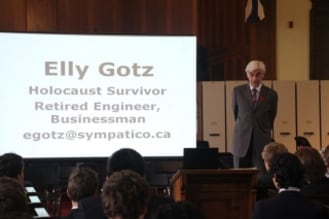
The details come back as if the horrors had happened only yesterday.
Deadly syringes lay out on a white blanket on a basement floor. The doorway is hidden by a large cupboard while Nazi soldiers barrel down the stairs kicking over everything in sight. “Will my mother have the courage to kill me,?” he wonders.
At 86 years old, Holocaust survivor, Elly Gotz, can tell you every startling detail of his young life in Ghetto Kaunas and the Dachau Concentration Camp. His story is one of hardship, deprivation, and survival. His telling brought tears to the eyes of many who listened.
Elly’s presentation to grade 9 and 10 students, faculty, and staff kicked off St. Andrew’s Week of Remembrance. He was only 17 when he was liberated by the American Amy but remembers clearly the day his town in Lithuania was separated between Jews and Christians, and his community surrounded by barbed wire and automatic weapons.
“I went to school, I was a nice kid, I had fun,” began Elly. “But I never went to high school because the war broke out.” He loved to build model airplanes, and dreamed of being an engineer, but at the age of 13 these dreams were dashed by genocide.
While Elly recounted many events, there were three that changed his life.
The first involved his 18-month old cousin. It was his job to care for her while they lived in the Ghetto. He would read her stories, take her for walks, sing her songs, and teach her three new words a day. He thought she was beautiful and smart, but one day, his aunt decided the Ghetto was too dangerous for her and contacted a Christian friend for help. Elly’s mother was a nurse and gave the baby medicine to make her sleep. His father put the baby in a duffle bag and left her behind a tree on his way to work. After three terrifying days, they received word that “the package had arrived.” Elly went into a deep depression for months afterwards not understanding why they had taken her from him.
The events of October 29, 1941 are recorded in history books; it is also etched forever in Elly’s memory. The 20,000 members of the Kaunas Ghetto were summoned to gather in a field. Each family passed through an inspection with a Nazi official; families were either sent left or right. The 10,000 who went left marched through the fence, up a hill to a military base where everyone man, woman, and child was shot dead and buried in mass trenches dug by Russian prisoners. That was the moment Elly realized his cousin was safe, and emerged from his depression.
The third event that changed his life was the day in 1945 when the Americans liberated them. Elly and his father, separated from his mother and aunt, were sent to the Dachau Concentration Camp. After 10 months of hard labour, many deaths, and starvation, the American’s finally came. Elly’s father was weak. He was sure to die any minute. Elly, who weighed less than 70 lbs now, had retrieved his father’s ration of soup and bread and upon returning to his father’s death bed, heard cheers, “the American’s are here.” Elly stayed with his father, not sure he would be able to get up. Hope, says Elly, brought his father back to life.
Three months passed before they found his mother and aunt. The family had survived the genocide, as did his baby cousin. Elly finished school and built his own airplane. He became an entrepreneur, and after 56 years of marriage, is still very much in love with his wife.
Elly, his wife, and their three children moved to Toronto in 1964. He was the president of his Synagogue and supports many Holocaust causes. Elly has served on the boards of Miles for Millions and Holocaust Remembrance Committee of the Christian Jewish Dialogue, and is active at the Holocaust Centre of Toronto. He regularly speaks to high schools and universities about his experience and the need for tolerance in society. He and his wife are currently transcribing and editing 450 recorded interviews with Holocaust survivors living in Toronto.
If all the documents about the killing of Jews during the Holocaust were laid out, it would span nearly 28 kilometers. Elly reminded students that the conspiracy theorists who believe the Holocaust was made up are wrong. He lived through it. Everything was documented, right down to receiving a receipt for the valuables stolen by Nazis.
“Prejudice is bad, it leads to unfairness, murder, and genocide,” he said. “Find out what people are like. You don’t have to like them, but you can learn about them.” He closed his speech with an old native saying, “please don’t feed the bad wolf.” Just as his father had survived by hope, Elly chose to let go of his hatred and embrace the good around him.
Story by Nicolette Fleming, St. Andrew's College